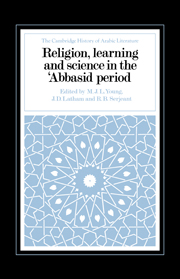Book contents
- Frontmatter
- Epigraph
- Contents
- List of plates
- Editorial preface
- List of abbreviations
- Map Literary, political and religious centres in the ʿAbbasid period
- 1 Sunnī theology
- 2 Shīʿī theological literature
- 3 Ibāḍī theological literature
- 4 Quranic exegesis
- 5 The prose literature of Ṣufism
- 6 Philosophical literature
- 7 Arabic lexicography
- 8 Arabic grammar
- 9 Islamic legal literature
- 10 Administrative literature
- 11 Arabic biographical writing
- 12 History and historians
- 13 Faṭimid history and historians
- 14 Mathematics and applied science
- 15 Astronomy
- 16 Astrology
- 17 Geographical and navigational literature
- 18 The literature of Arabic alchemy
- 19 Arabic medical literature
- 20 Al-Kindī
- 21 Al-Rāzī
- 22 Al-Fārābī
- 23 Ibn Sīnā
- 24 Al-Bīrūnī and the sciences of his time
- 25 Al-Ghazālī
- 26 Christian Arabic literature in the ʿAbbasid period
- 27 Judaeo-Arabic literature
- 28 The translation of Greek materials into Arabic
- 29 Didactic verse
- Glossary
- Bibliography
- Index
22 - Al-Fārābī
Published online by Cambridge University Press: 05 July 2014
- Frontmatter
- Epigraph
- Contents
- List of plates
- Editorial preface
- List of abbreviations
- Map Literary, political and religious centres in the ʿAbbasid period
- 1 Sunnī theology
- 2 Shīʿī theological literature
- 3 Ibāḍī theological literature
- 4 Quranic exegesis
- 5 The prose literature of Ṣufism
- 6 Philosophical literature
- 7 Arabic lexicography
- 8 Arabic grammar
- 9 Islamic legal literature
- 10 Administrative literature
- 11 Arabic biographical writing
- 12 History and historians
- 13 Faṭimid history and historians
- 14 Mathematics and applied science
- 15 Astronomy
- 16 Astrology
- 17 Geographical and navigational literature
- 18 The literature of Arabic alchemy
- 19 Arabic medical literature
- 20 Al-Kindī
- 21 Al-Rāzī
- 22 Al-Fārābī
- 23 Ibn Sīnā
- 24 Al-Bīrūnī and the sciences of his time
- 25 Al-Ghazālī
- 26 Christian Arabic literature in the ʿAbbasid period
- 27 Judaeo-Arabic literature
- 28 The translation of Greek materials into Arabic
- 29 Didactic verse
- Glossary
- Bibliography
- Index
Summary
Unlike the changes which Muslim names frequently underwent in the Latin West, the last name of Abā Naṣr Muḥammad b. Muḥammad b. Tarkhān b. Awzalugh (or Uzlugh) al-Fārābī was barely altered, and it is as “Alfarabi” that it has been common to refer to him. Al-Fārābī's name, however, may be the only constant on which to seize at the moment, as contemporary scholarship challenges previous assessments of his work. Al-Fārābī appears increasingly as a disarmingly subtle thinker, an individualist with a civic conscience, a man who attempted to reconcile Plato and Aristotle, philosophy and theology, Athens and Mecca.1 The syntheses attempted, however, are neither facile nor dogmatic, and proceed from a predominantly philosophical standpoint. The exact nature of al-Fārābī's philosophical credo, moreover, is still being questioned.
The question is complicated by the lack of a sure chronology for al-Fārābī's many compositions, and an equal ignorance of the particular circumstances which prompted each work in a given genre: the motivation, purpose and intended audience. With few sure criteria of a biographical or stylistic sort to assist them, scholars are forced to choose between differing statements and emphases in related texts, and even within the same text, to determine al-Fārābī's genuine convictions. Moreover, the work of Leo Strauss, Muhsin Mahdi and others has drawn attention to the likelihood that al-Fārābī deliberately shielded essential elements of his convictions from the eyes of the uncritical reader.
- Type
- Chapter
- Information
- Religion, Learning and Science in the 'Abbasid Period , pp. 378 - 388Publisher: Cambridge University PressPrint publication year: 1990
- 1
- Cited by



